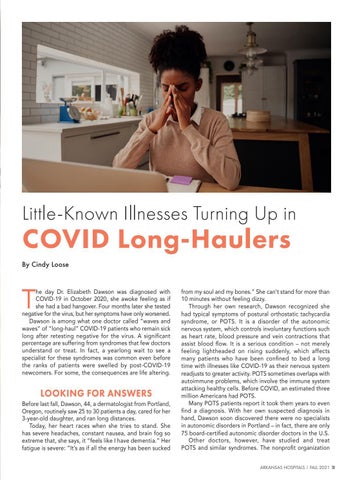Little-Known Illnesses Turning Up in
COVID Long-Haulers
By Cindy Loose
T
he day Dr. Elizabeth Dawson was diagnosed with COVID-19 in October 2020, she awoke feeling as if she had a bad hangover. Four months later she tested negative for the virus, but her symptoms have only worsened. Dawson is among what one doctor called “waves and waves” of “long-haul” COVID-19 patients who remain sick long after retesting negative for the virus. A significant percentage are suffering from syndromes that few doctors understand or treat. In fact, a yearlong wait to see a specialist for these syndromes was common even before the ranks of patients were swelled by post-COVID-19 newcomers. For some, the consequences are life altering.
LOOKING FOR ANSWERS
Before last fall, Dawson, 44, a dermatologist from Portland, Oregon, routinely saw 25 to 30 patients a day, cared for her 3-year-old daughter, and ran long distances. Today, her heart races when she tries to stand. She has severe headaches, constant nausea, and brain fog so extreme that, she says, it “feels like I have dementia.” Her fatigue is severe: “It’s as if all the energy has been sucked
from my soul and my bones.” She can’t stand for more than 10 minutes without feeling dizzy. Through her own research, Dawson recognized she had typical symptoms of postural orthostatic tachycardia syndrome, or POTS. It is a disorder of the autonomic nervous system, which controls involuntary functions such as heart rate, blood pressure and vein contractions that assist blood flow. It is a serious condition – not merely feeling lightheaded on rising suddenly, which affects many patients who have been confined to bed a long time with illnesses like COVID-19 as their nervous system readjusts to greater activity. POTS sometimes overlaps with autoimmune problems, which involve the immune system attacking healthy cells. Before COVID, an estimated three million Americans had POTS. Many POTS patients report it took them years to even find a diagnosis. With her own suspected diagnosis in hand, Dawson soon discovered there were no specialists in autonomic disorders in Portland – in fact, there are only 75 board-certified autonomic disorder doctors in the U.S. Other doctors, however, have studied and treat POTS and similar syndromes. The nonprofit organization ARKANSAS HOSPITALS | FALL 2021 39
